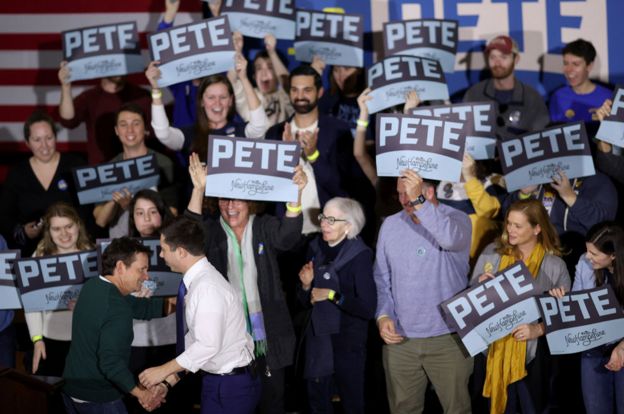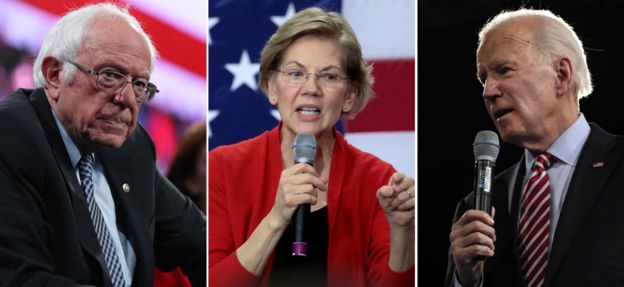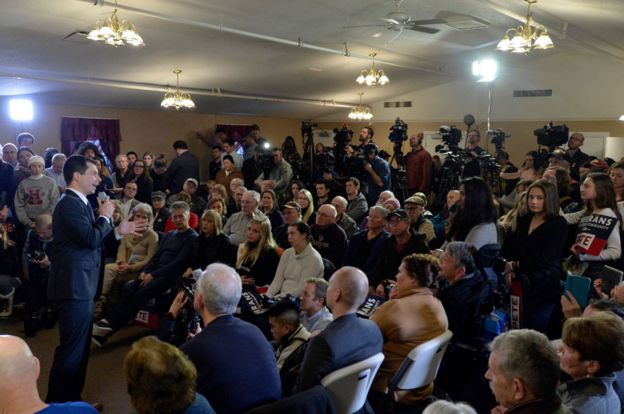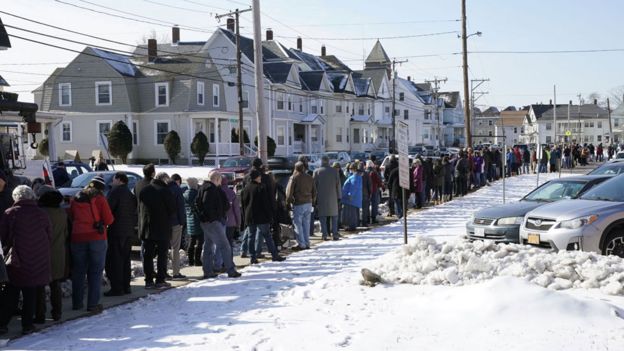This article is more than
6 year old
There's an old saying about the way the two parties pick their presidential nominees - Democrats fall in love; Republicans fall in line.
After a 2016 election that turned conventional wisdom on its head by producing iconoclastic Donald Trump and establishment-favourite Hillary Clinton as the nominees, that nostrum could be reasserting itself. While the Republican Party is closing ranks behind the president, there's nothing logical or expected about the early success Pete Buttigieg is having in the Democratic fight to take on Trump in November.
He's the former mayor of a modest-sized Indiana city, the 306th-largest in the US - a college town like Oxford in the UK, only smaller.
He's 38 years old, which would make him the youngest president in US history.
He's also the first openly gay major-party presidential candidate, a historic candidacy that would have seemed inconceivable just a few decades ago, when Republicans were campaigning - and winning - on opposition to gay marriage and mainstream Democrats, by and large, avoided the issue.
Yet here he is, the narrow victor of the Iowa caucuses and near the top of the top of the polls in New Hampshire, which holds its primary on Tuesday.
In 2019, Buttigieg raised more than $76m in donations for his presidential campaign - an astronomical number for a man who was a political unknown at the start of the year and who still struggles to get his name pronounced correctly (it's boot-edge-edge).
At a campaign rally in Keene, New Hampshire, on Saturday, actor Michael J Fox riffed on the candidate's unorthodox political background, describing him as a "left-handed, Maltese-American, Episcopalian, millennial, gay war veteran".

The crowd in a packed college auditorium erupted in laughter. They roared for Buttigieg, as he strode out onto the stage in his now-trademark jacket-less dress shirt and tie, abandoning the lectern to pace the stage with a wireless microphone.
"I absolutely love his energy," said Susan Szyldo, a registered nurse from nearby Dublin. "I love his youthfulness. I just think it would be a whole new fresh perspective in Washington, which we need desperately."
Husbands Scott Hadland and Jason Bassi from Massachusetts stood near the front of the crowd with their son, Jeremy.
"We're really excited to see the first presidential candidate who identifies as gay," Hadland said. "It really means a lot to us to be able to see him in person."
Shane O'Keefe, a town administrator from Walpole attending his third Buttigieg rally, was equally effusive.
"He's tells it like it is," he said. "He's a very thoughtful person. He's a very knowledgeable and knows the issues that affect people like myself and others."
Listen to Buttigieg supporters, and this is kind of praise that regularly comes up. He's smart. He talks in full paragraphs, not soundbites. He is calm and composed. They say he's a refreshing change from the current occupant of the White House - and even his competitors for the Democratic nomination.
"I watched the debate the other night, and I respect the other candidates, but they're all yelling at me," Fox said of Friday's Democratic face-off in Manchester. "But Pete isn't screaming. He's talking to me. He's the one guy who's quiet and making his point."
If it seemed to Fox like the candidates were yelling during that debate, it could be because they were turning their fire on his guy.
Minnesota Senator Amy Klobuchar - competing with Buttigieg for the pragmatic, moderate vote - suggested Buttigieg was insincere and that he had abandoned a pledge to support more sweeping health insurance reform in a calculated attempt to move to the middle. She also pushed back at his criticism of veteran Washington politicians as establishment insiders.
"It is easy to go after Washington, because that's a popular thing to do," she said. "It is much harder to lead."
Joe Biden, the former front-runner who appears to have suffered the most from Buttigieg's surge, called him a small-town mayor who didn't have the experience to be president.
His campaign followed that attack with an online video derisively comparing Biden's achievements as vice-president with Buttigieg's mayoral record of "decorative brick" replacement, bridge lighting and pet chip licensing in South Bend.
"I do believe we are a party at risk if we nominate someone who's never held a higher office than the mayor of South Bend, Indiana," Biden told reporters on Saturday.

What are the key issues for all the candidates?
Meanwhile, the Sanders campaign was firing off fund-raising emails to supporters noting that Buttigieg has a "national investors circle" of donors giving tens of thousands of dollars to support his campaign.
"Needless to say, Bernie doesn't have bundlers or an 'investors circle'," it read. "But he does have YOU."
Massachusetts Senator Elizabeth Warren, scrambling for support in New Hampshire, took her own thinly veiled shot.
"I'm not running a race that's been shaped by consultants," she said on Saturday night. "I'm not offering proposals that are carefully designed not to offend big donors. I passed that stop sign a long time ago."
Buttigieg has done his best to parry the attacks, painting the criticisms as the response of an out-of-touch elite fixed on the past and dismissive of middle America.
"While Washington politics trivializes what goes on in communities like South Bend, South Bend residents who now have better jobs, rising income, and new life in their city don't think their lives are a Washington politician's punchline," the campaign said in a statement responding to the Biden video.

If Buttigieg is taking fire from all sides, it's because multiple campaigns view his rise as a mortal danger - and they're treating him accordingly.
In the last half-century, since the modern presidential nomination process first began, there have only been two non-incumbent Democrats who have won Iowa and New Hampshire - Al Gore in 2000 and John Kerry in 2004. Both went on to win the party's nomination.
While Buttigieg's ultimate fate in New Hampshire is still up in the air - polls suggest almost half the state's voters haven't made up their mind - his surge into a statistical dead heat with Bernie Sanders, the state's 2016 primary winner, suggests such a feat is in reach. And while the Vermont senator could claim similar momentum with a win in New Hampshire, his backers are loyal and unlikely to waiver. Buttigieg's, on the other hand, are new converts and, in the view of his opponents at least, more easy to sway.
Still, flush with money, the Buttigieg operation in New Hampshire has all the trappings of a slickly produced campaign that's built to win. Eye-popping blue and yellow yard signs touting "Mayor Pete" dot the landscape throughout this snow-covered state. His adverts, heavy on positivity and inspirational messaging, blanket the local television stations. At a multi-candidate dinner/rally held by the state's Democratic Party on Saturday night, Buttigieg supporters - vocal and organised - appeared to be the largest contingent in attendance.
In this New England state - like Iowa before it, predominantly white and largely rural - it feels like Buttigieg is approaching breakaway speed. A look at national polls and those of the states holding primaries in the weeks to come, however, paint a decidedly different picture.
The modern Democratic Party electorate does not look like New Hampshire or Iowa. It's much more diverse and much more urban. Surveys of Nevada and South Carolina show Buttigieg languishing a distant fifth. Nationally, he's in the high single digits, as billionaire Michael Bloomberg, pouring money into television advertising, pulls past him.
Multiple polls show that Buttigieg has next to no support from black voters - occasionally registering at an astounding zero per cent. He's an unknown to this key Democratic demographic, and the impression he's made so far - including coverate of the his clashes with the black community when he was mayor of South Bend - hasn't helped.
In Friday night's debate, Buttigieg struggled to explain why blacks in his town had a higher arrest rate for drug offences than whites - offering an answer Elizabeth Warren said was not sufficient.

Afterward, two Buttigieg backers - Congressman Anthony Brown and New Hampshire legislator Maura Feldman - were pressed by reporters to how Buttigieg would expand his appeal among black voters and get more traciton in the states to come.
Their answers didn't give much clarity.
"This is not about carving up the electorate and looking at African-American voters as some commodity," said Congressman Anthony Brown of Maryland, the most prominent black politician supporting Buttigieg. He said black voters, like the voters in New Hampshire and Iowa, will care about Buttigieg's message on healthcare, jobs and the environment.

Maura Sullivan, the campaign's New Hampshire co-chair, offered generic optimism.
"Passion wins elections, not polls," she said. "And it's undeniable coming out of Iowa and what we're seeing on the ground here that this is a movement, and it's building and it's just going to continue to grow."
In an interview on Sunday, Buttigieg himself said he simply hopes his success in Iowa and New Hampshire prompts Democrats across the US to give him a first - or second - look.
At the Buttigieg rally in Keene, however, even his loyal supporters had some concerns. Joshua Goldstein, who drove with his friends from New York to see the candidate, says he is 100% concerned about the mayor's ability to attract support in his home state and other more diverse locations.
"I think that that will definitely be his biggest challenge in persuading voters across the country that he's electable," Goldstein says.
So what can Buttigieg do about it?
"I have no idea," he says. "I wish him the best of luck with that."